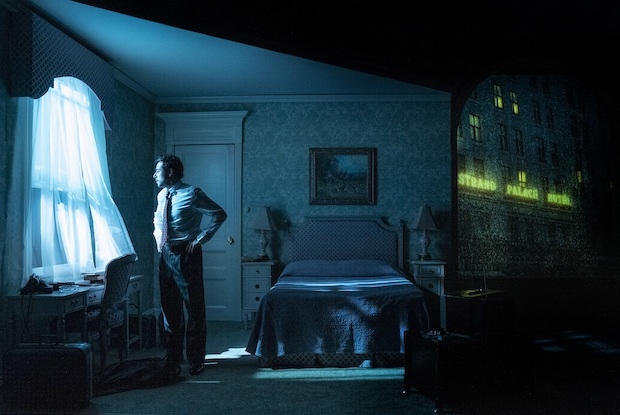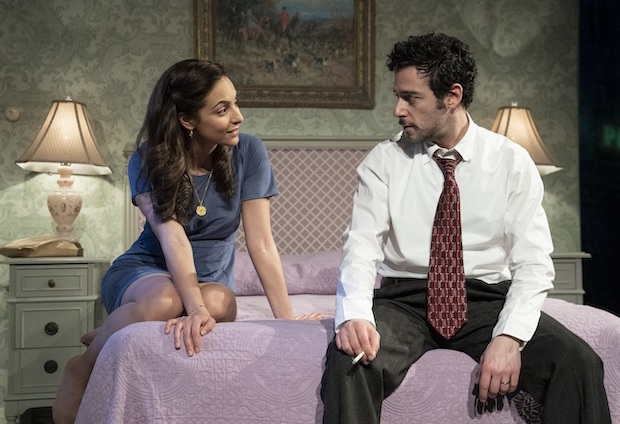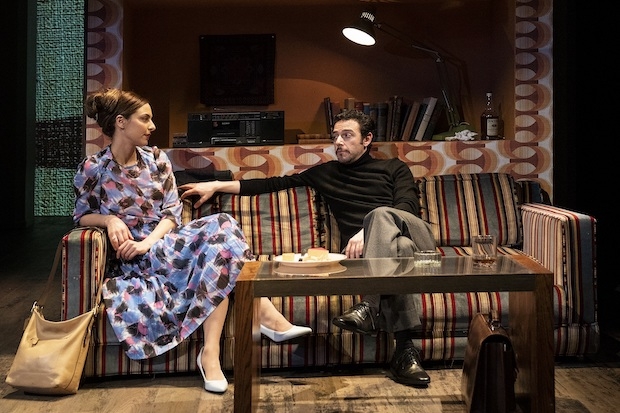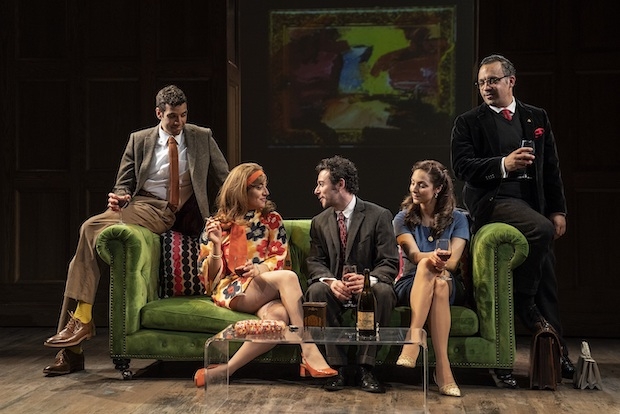Review: In The Vagrant Trilogy, Palestinians Long for Home, and Can't Wait to Escape
The Public Theater presents Mona Mansour’s trio of one-act plays, a decade in the making.

(© Joan Marcus)
A refugee camp is meant to be temporary, but Burj El Barajneh, a camp for Palestinian refugees in Lebanon, has been operating since 1949 — one year after the formation of the modern State of Israel, which displaced so many. It is one of many operating in Jordan, Lebanon, and Syria. According to the UN, the refugees have a right to return, but to what would they return? Certainly not the same country they left, if they left at all: Generations have been born (and some have died) in the camps waiting for an unlikely homecoming, unable to work and unable to obtain citizenship in the host country. They are in a limbo from which very few escape.
That is the backdrop to Mona Mansour's The Vagrant Trilogy, a trio of interconnected one-act plays that examine the life of one Palestinian man who had the option to get out. Now making its long-delayed New York debut at the Public Theater, it is performed by a shapeshifting ensemble of talented actors and is more bingeable than a Netflix series (each part runs about an hour). Chances are, you won't have the opportunity to see it (more on that later).

(© Joan Marcus)
The Trilogy appropriately begins with Ahdam (Bassam Abdelfattah), originally from Galilee, but residing in the West Bank following his family's expulsion. The first play starts in 1967 when Ahdam is 23. A budding academic in the field of Romantic English poetry, Ahdem has been invited to University College, London, to give a talk on Wordsworth. Before he goes, he meets and falls in love with Abir (Caitlin Nasema Cassidy), a farmer's daughter of whom Ahdem's mother disapproves. They elope and travel to London together right before the Six-Day War, in which Israel would conquer the West Bank (a territory it occupies to this day). This sets up Adham and Abir for the most consequential choice of their entire lives: to stay in London or return?
The second part, The Vagrant, imagines Adham's life as an academic in London circa 1982. The third part, Urge for Going, imagines Adham's life if he went back, only to become a permanent resident of a refugee camp. It is set in 2003 and shifts focus to Adham and Abir's daughter, Jamila (Nadine Malouf), who inherited her father's work ethic and love of language long after he seems to have discarded both (this section was presented at the Public as a standalone production in 2011).

(© Joan Marcus)
As if we need further proof that our lives are subject to forces beyond our control, this New York debut of The Vagrant Trilogy has been especially plagued by Covid, which is why this review arrives in the final week of performances. Abdelfattah and Cassidy are understudies to Hadi Tabbal and Tala Ashe, both out sick. While those who saw them earlier this year in Sanaz Toosi's English can imagine the sparks flying between Tabbal and Ashe, Abdelfattah and Cassidy leave us wanting for nothing with a chemistry that feels natural and grows in complexity as the play progresses.
Abdelfattah tells a whole story about aspiration and assimilation with his shifting accent, which becomes far more English in the second part while maintaining certain Arabic inflections. Adham identifies as an English academic, but he inhabits a world that expects Edward Said and will settle for nothing else — so even though he has escaped Palestine, he cannot escape the label of Palestinian. Physically, he cannot leave the camp in the third part, in which he transforms into a convincingly dispirited old man. With his big, dejected eyes and radiating regret, Abdelfattah makes us feel Adham's dilemma, which is essentially a choice between two cages. Personally, I would pick the one with Scotch and a bedroom I don't have to share.
The other outstanding performance of Vagrant comes from Malouf, who gives Catherine Tate a run for her money with a series of comic relief roles in the first two parts. She also takes on the role of Adham's mother, whose grievances and prejudices haunt Adham throughout (Malouf makes an intimidating ghost). Finally, she becomes an angsty teenager in the third part, plotting her own escape through the baccalaureate test (which her parents aren't sure she is even eligible to take). It's hard to believe she's the same actor from the earlier parts. It's hard to believe there are only three other actors (Osh Ashruf, Rudy Roushdi, and Ramsey Faragallah) in the production.

(© Joan Marcus)
Director Mark Wing-Davey's versatile staging slides seamlessly from Brechtian epic (the no-nonsense exposition) to domestic drama, as elements of Allen Moyer's expansive set slide into place: a London hotel room, a wood-paneled reception room, a cavernous lecture hall (Moyer and video designer Greg Emetaz make particularly good use of the preexisting arches of the LuEsther Theater). Dina El-Aziz's costumes convey a sense of time and place while cleverly complementing the performances, like when Adham's black turtleneck seems to be literally suffocating him. Tom Watson performs magic with hair, wig, and makeup so that the actors age up, age down, and transform into different people with very little offstage time.
The dynamism of the first two parts becomes stasis in the third, in which the stage is dominated by a tent structure that is at once flimsy and yet feels depressingly permanent. Little elements on the set (the flash of a hideous couch from part two) remind us of the life that could have been, still lingering somewhere in the multiverse.
As she did in her play The Way West, Mansour presents flawed, deeply relatable characters in a seemingly intractable situation. Far from a political polemic about the Middle East, The Vagrant Trilogy shows the human cost of history and forces us to imagine what we would do if given Adham's choice — if we were even lucky enough to have a choice.









